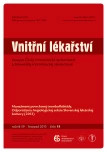Possibilities of genetic diagnostics of intestine tumour and inflammatory diseases in Slovakia
Authors:
B. Desatová 1; M. Bátovský 1; I. Mľkvá 2
Authors‘ workplace:
Klinika gastroenterológie Lekárskej fakulty SZU a UN Bratislava, Slovenská republika, prednosta doc. MU Dr. Marian Bátovský, CSc., mim. prof. SZU
1; Oddelenie klinickej genetiky Ústavu lekárskej biológie, genetiky a klinickej genetiky Lekárskej fakulty UK a UN Bratislava, Slovenská republika, prednosta doc. MU Dr. Daniel Böhmer, PhD.
2
Published in:
Vnitř Lék 2013; 59(11): 977-980
Category:
Review
Overview
In recent years, gastroenterologists focused their interest on finding the genetic background of inflammatory bowel disease and colon cancer. NOD2/ CARD15 gene is still the most investigated gene of all known genes and its mutations can explain approximately 20% of genetic predisposition to Crohn’s disease. From later identified genes that play an important role in the etiology of Crohn’s disease, the IL23R and ATG16L1 genes have a perspective place. In the case of hereditary colorectal cancer, we can select by the help of genetic diagnostics, the group of patients with high risk of colon cancer, which requires more intensive monitoring. The aim is to find out the colon cancer in the early, treatable stage. In practical terms, genetic diagnostics of inflammatory bowel disease and colon cancer has no screening and only poor prognostic importance. It is pleasant, that the Slovak genetic workplaces are interested in this issue and in accordance with modern trends they try to expand its diapason.
Key words:
inflammatory bowel disease – genetic analyses – NOD2/ CARD15 – hereditary colorectal cancer
Sources
1. Boland CR. Chronic inflammation, colorectal cancer and gene polymorphisms. Dig Dis 2010; 28 : 590 – 595.
2. Bátovský M. Genetická diagnostika nešpecifických črevných zápalov a kolorektálneho karcinómu – aktuálny prehľad. Lek Obz 2008; 56 : 119 – 123.
3. Akkiprik M, Ataizi ‑ Celikel C, Düsünceli F et al.Clinical Significance of p53, K ‑ ras and DCC Gene Alterations in the Stage I – II Colorectal Cancers. J Gastrointestin Liver Dis 2007; 16 : 11 – 17.
4. Bátovský M. Genetické puzzle v diagnostike kolorektálneho karcinómu. Gastroenterol prax 2008; 7 : 82 – 84.
5. Bolocan A, Ion D, Stoian RV et al. Map syndrome (MYH Associated Polyposis) colorectal cancer, etiopathological connections. J Med Life 2011; 4 : 109 – 111.
6. Pritchard CC, Grady WM. Colorectal cancer molecular biology moves into clinical practice. Gut 2011; 60 : 116 – 129.
7. Cho JH. Inflammatory bowel disease: Genetic and epidemiologic considerations. World J Gastroenterol 2008; 14 : 338 – 347.
8. Zhang H, Massey D, Tremelling M et al. Genetics of inflammatory bowel disease: clues to pathogenesis. Br Med Bull 2008; 87 : 17 – 30.
9. Fritz T, Niederreiter L, Tilg H et al. Controversy over NOD2, inflammation and defensis. Inflamm Bowel Dis 2010; 26 : 1996 – 1998.
10. Limbergen JV, Russell RK, Nimmo ER et al. The Genetics of Inflammatory Bowel Disease. Am J Gastroenterol 2007; 102 : 2820 – 2831.
11. Bátovský M. Novinky v etiopatogenéze a v genetickej diagnostike nešpecifických črevných zápalov. Gastroenterol prax 2008; 7 : 59 – 61.
12. Hamm CM, Reimers MA, McCullough CK et al. NOD2 status and human ileal gene expression. Inflamm Bowel Dis 2010; 16 : 1649 – 1657.
13. Bátovský M, Desatová B, Páv I et al. Génový polymorfizmus NOD2/ CARD15 významne vplýva na skorší vznik Crohnovej choroby v populácii slovenských pacientov. Čes Slov Gastroent Hepatol 2009; 63 : 208 – 215.
14. Begum NA, Ishii K, Kurita ‑ Taniguchi M et al. Mycobacterium bovis BCG cell wallspecific differentially expressed genes identified by differential display and cDNA subtraction in human macrophages. Infect Immun 2004; 72 : 937 – 948.
15. Noble CL, Abbas AR, Lees CW et al. Characterization of intestinal gene expression profiles in Crohn’s disease by genome ‑ wide microarray analysis. Inflamm Bowel Dis 2010; 16 : 1717 – 1728.
16. Haritunians T, Taylor KD, Targan SR. Genetic predictors of medically refractory ulcerative colitis. Inflamm Bowel Dis 2010; 16 : 1830 – 1840.
Labels
Diabetology Endocrinology Internal medicineArticle was published in
Internal Medicine

2013 Issue 11
-
All articles in this issue
- Prevalence of diabetic retinopathy and distal symmetrical diabetic polyneuropathy, and glomerular filtration screening upon the diagnosis of type 2 diabetes mellitus – a cohort study
- Serious sepsis treatment in intensive care departments in the Czech Republic – EPOSS Project pilot results
- The new blood test biomarker SEPT9 and colorectal carcinoma screening
- Possibilities of genetic diagnostics of intestine tumour and inflammatory diseases in Slovakia
- SAVOR‑ TIMI 53 – Saxagliptin and cardiovascular outcomes in patients with type 2 diabetes mellitus
- Management of superficialis thrombophlebitis. Guidelines of the Angiologiy Section of the Slovak Medical Chamber (2013)
- The value of ECG assessment in pulmonary embolism diagnostics
- Atypical fracture of metatarsal bone in a patient with multiple myeloma who was treated long-term with bisphosphonates
- Inflammatory response and C‑ reactive protein value in patient with acute coronary syndrome
- Thyrostatic treatment and its adverse effects
- Role of cardiac biomarkers in monitoring of cardiotoxicity after hematopoietic stem cell transplantation
- Internal Medicine
- Journal archive
- Current issue
- Online only
- About the journal
Most read in this issue
- Thyrostatic treatment and its adverse effects
- Inflammatory response and C‑ reactive protein value in patient with acute coronary syndrome
- The value of ECG assessment in pulmonary embolism diagnostics
- Management of superficialis thrombophlebitis. Guidelines of the Angiologiy Section of the Slovak Medical Chamber (2013)
